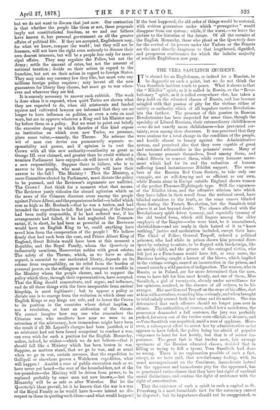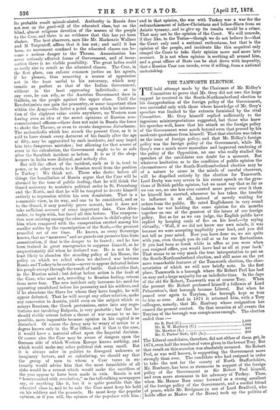THE VERA SASULITCH INCIDENT.
IT is absurd for an Englishman, or indeed for a Russian, to be dogmatic on such a point, but we do not think the Vera Sasulitch incident tends to peace. What it shows is that the " Nihilist " spirit, as it is called in Russia, or the " Revo- lutionary " spirit, as it is called everywhere else, has taken a deep hold on the educated classes of Russia, and has become mingled with that passion of pity for the victims either of society or authority which of all impulses carries Revolution- ists the farthest. The presence of this passion in Russian Revolutionists has been suspected for some time, though the specialty of Liberal Russians, their extraordinary childlikeness —we do not exactly mean childishness—has prevented cer- tainty, even among close observers. It was perceived that they were anxious for a total change in the condition of the people, and hostile almost to lunacy against the Administrative system, and perceived also that they were capable of great and sustained self-sacrifice in the peasants' cause. Many of them became peasants themselves, lived among them, and risked Siberia to convert them, while every humane move- ment which had for its end the reduction of human suffering found instantaneous Nihilist support. The mem- bers of the Russian Red Cross Society, to take only one example, are as self-denying and as efficient as our own, while Russia alone in Europe outside England shows women of the perfect Florence-Nightingale type. Still the vagueness of the Nihilist ideas, and the offensive atheism into which they have fallen in their recoil from the national creed, have blinded outsiders to the truth, as the same causes blinded them during the French Revolution, but the Sasulitch trial places it at last beyond doubt. The classes affected with the Revolutionary spirit detest tyranny, and especially tyranny of the old brutal form, which still lingers among the elder employ6s of the Empire—who were bred, be it remembered, slaveholders—and are ready in their hatred of it to " know nothing," justice and moderation included, except their hate. The Chief of Police, General Trepoff, ordered a political prisoner, who had while in prison shown him personal disre- spect by refusing to salute, to he flogged with birch-twigs, like an unruly child, and the groans of the outraged victim, who felt just as a Frenchman would have felt, or even more, the Russians having caught a horror of the blows, which implied in the victims serfage, caused an insurrection in the prison, and roused outside a wild passion of indignation. The women, who in Russia, as in Poland, are far more determined than the men. seem to have felt for him most keenly, and one of them, Miss Sasulitch, a girl of twenty-six, already under surveillance for her opinions, resolved, in the absence of all redress, to be his avenger. She met General Trepoff on the steps of his office, shot
at him with a revolver, wounding him seriously, and when brought to trial calmly avowed both her crime and its motive. She was determined that such offences should no longer pass over in silence. The authorities, of course, called her a murderess, the prosecutor demanded a full sentence, the jury was probably packed, for seven out of the twelve were officials or di!;cor6s and —Vera Sasulitch was acquitted, amid a roar of applause. ifore- over, a subsequent effort to arrest her by administrative order appears to have failed, the police being too afraid of popular vengeance to hunt for her keenly, but that is of minor im- portance. The great fact is that twelve men, fair average specimens of the Russian educated classes, decided that in killing or trying to kill a tyrant Vera Sasulitch had done no wrong. There is no explanation possible of such a fact, except, as we have said, that revolutionary feeling, with its usual accompaniment on the Continent, immoderate hatred for the oppressor and immoderate pity for the oppressed, has so penetrated entire classes that they have lost sight of cardinal moral distinctions, and confuse the right of resistance with the right of assassination.
That the existence of such a spirit in such a capital as St. Petersburg is a most formidable fact for the autocracy cannot be disputed ; but its importance should not be exaggerated, or its probable result miscalculated. Authority in Russia does not rest on the good-will of the educated class, but on the blind, almost religious devotion of the masses of the people to the Czar, and there is no evidence that this has yet been shaken. The best observers, men like Mr. Mackenzie Wallace and M. Turgenieff, affirm that it has not ; and until it has been, no movement confined to the educated classes can be- come a serious danger to the Throne. Assassination has never seriously affected forms of Government, and of insur- rection there is no visible possibility. The great ladies could as easily rise in revolt as the educated classes. The Czar, in the first place, can enforce common justice on his agents, if he pleases, thus removing a source of oppression not in the least useful to his autocracy, which may remain as perfect as that of the Indian Government, without in the least oppressing individuals ; or in any case, he can rely, as the Austrian Government does in Gallicia, on the people against the upper class. Until the Revolutionists can gain the peasantry, or some important class within the Army—the latter a point upon which no informa- tion of the slightest value exists anywhere, no Western man having even an idea of the secret opinions of Russian non- commissioned officers—there does not exist in Russia the force to shake the Throne, or even to create dangerous disturbance. The melancholia which has struck the present Czar, as it is said to have struck every Autocrat of his family after the age of fifty, may be aggravated by such incidents, and may impel him into dangerous mistakes ; but allowing for that source of error in the calculation, the Government ought to be as safe after the Sasulitch incident as before. It is as if the shop- keepers in India were disloyal, and nobody else.
But will the effect of the incident, such as it is, tend to peace, or in other words, to a Russian recoil from the position in Turkey ? We think not. Those who desire before all things the humiliation of Russia argue that the Czar will be alarmed by the tone of public feeling, that he will think the Guard necessary to maintain political order in St. Petersburg and the North, and that he will be tempted to devote himself entirely to repression within his own dominions. That is a reasonable view, in its way, and one to be considered, and as to the Guard, it may possibly prove correct, but it does not take sufficient account of some important data. Czar Alex- ander, to begin with, has faced all this before. The exaspera- tion now existing among the educated classes is child's-play for him when compared with the exasperation created among his smaller nobles by the emancipation of the Serfs,—the greatest remedial act of our time. He knows, as every Sovereign knows, that no " measures" and no guards can preserve him from assassination, if that is the danger to be feared ; and he has been trained in great emergencies to suppress himself, as he unquestionably did when he declared war. He is not in the least likely to abandon the standing policy of his House, the policy on which we relied when we declared war between Russia and Turkey to be certain—never to appear defeated before his people except through the result of battle. God settles that, in the Russian mind ; but defeat before action is the fault of the Czar, who must not, according to Russian feeling, retreat from mere fear. The new incident only increases his need for appearing unsubdued before his peasantry and his soldiers, and if he abandons the Slays for whom they have fought, he will appear defeated. That he will accept any other solution, make any concession to Austria, yield even on the subject which so annoys Russians, the Greek pretensions, enter into any nego- tiations not involving Bulgaria, is very probable ; but that he should visibly retreat before a threat of war seems to us im- possible, more impossible because opinion in his capital is so disturbed. Of course the Army may be weary of action to a degree known only in the War Office, and if that is the case, it would have a material effect upon the Imperial decision. Of course also the Czar may be aware of dangers upon the German side of which Western Europe knows nothing, and which would make any other political risk seem small. But it is always safer in politics to disregard unknown or imaginary factors, and so calculating, we should say that the group of men to whom a Czar turns in ex- tremity would advise him that the most formidable of all risks would be a retreat which would make the sacrifices of the year appear to have been made in vain. Russia is not " honeycombed with revolution," as the tall-talking newspapers say, or anything like it, but it is quite possible that the educated class is, and to be safe the Czar must keep his hold on his soldiery and the peasants. He must keep the popular opinion, or if you will, the opinion of the populace with him ;
and in that opinion, the war with Turkey was a war for the enfranchisement of fellow-Christians and fellow-Slays from an Asiatic tyranny, and to give up its results would be a crime. That may not be the opinion of the Court. We will concede, if they like, to the Tories—though we do not believe it—that the Court only used a national enthusiasm, but that is the opinion of the people, and incidents like this acquittal only compel the Czars to take their opinion more and more into account. It is not when opinion is seething. all around him, and a. great officer of State can be shot down with impunity, that a Russian Czar can recede, even if willing, from a national undertaking.



































 Previous page
Previous page